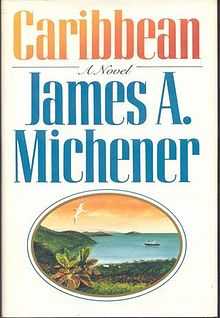Caribbean (novel)
 First edition cover | |
| Author | James Michener |
|---|---|
| Country | United States |
| Language | English |
| Genre | Historical novel |
| Publisher | Random House |
Publication date | 1989 |
| Media type | Print (Hardback) |
| Pages | 672pp. |
| ISBN | 0-394-56561-4 |
The historical novel Caribbean (1989), written by James A. Michener, depicts the history of the Caribbean region from the time of the native Arawak tribes until about 1990. It mixes fact and fiction as Michener notes in the foreword. For example, the story about the island of All Saints is purely fictional, though the book's map shows it as an island in the location of Saint Lucia.[1]
Chapter Summary
- A Hedge of Croton: the invasion of the Caribs in the Arawak homelands.
- Death of Greatness: the classic Mayan Period.
- Christopher Columbus in Hispaniola: the trial of Christopher Columbus after his ruthless rule of Hispaniola.
- The Spanish Lake: the adventures of Sir Francis Drake.
- Big Storms in Little England: history of Barbados.
- The Buccaneer: stories of Henry Morgan and English privateers.
- The Sugar Interest: a fictional story that revolves around the island St. John's and the Caribbean sugar monopoly.
- A Wedding on Nevis: the accounts of Horatio Nelson.
- The Creoles: a history of Guadeloupe.
- The Tortured Land: Haiti and the Haitian Revolution.
- Marshal Law: the Morant Bay rebellion and following legal battle between John Stuart Mill and Alfred Tennyson.
- Letters of Introduction: a fictional account of "All Saints Island"[1] and a Caribbean perspective of the pre-World War 2 relationship between United Kingdom and Germany.
- The Scholar: a fictional story of a young Trinidadian scholar who leaves the University of West Indies to stay in Miami shortly after the Cuban population boom.
- The Rasta Man: a fictional story of a young Rastafarian whose travels to All Saint's Island revolve around the Caribbean obsession over cricket.
- Twins: a fictional story of a two Cuban refugees returning to Cuba that culminates with a meeting with Fidel Castro.
- The Golden Sea: in typical Michener fashion, the final chapter revolves around a character meeting descendants and other characters from previous chapters.
References
| ||||||||||||||||||